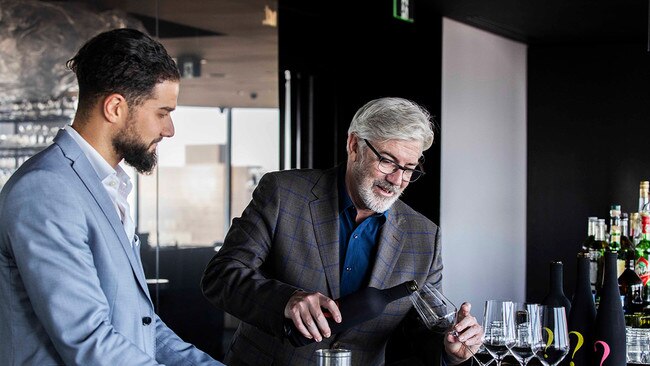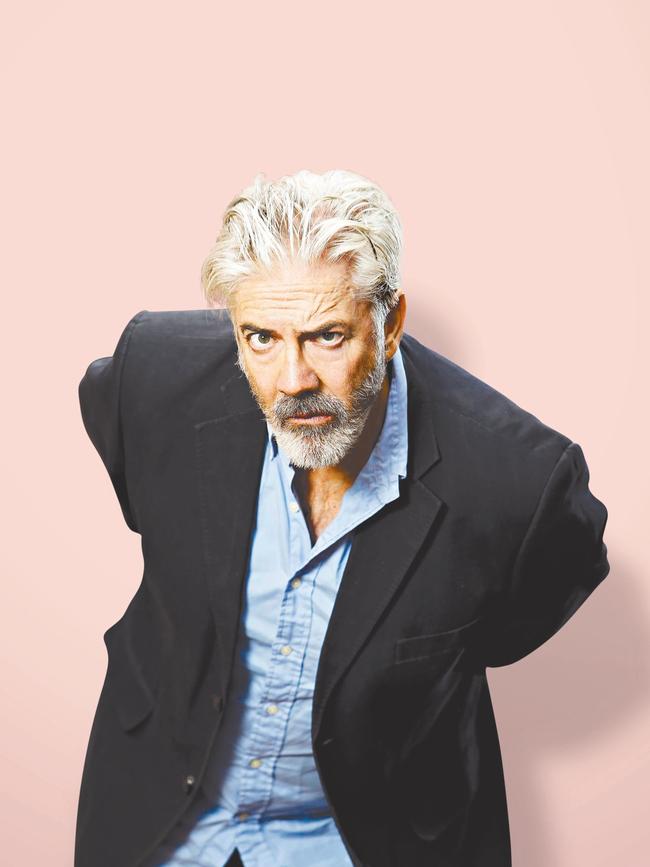Graeme Blundell reviews Shaun Micallef’s On the Sauce
ABC presenter and teetotaller Shaun Micallef’s booze quest is both physical and deeply personal.

Shaun Micallef is traipsing in his supremely nonchalant fashion down a long road in the South Australian Outback at the start of his new show. It’s the place, he tells us, almost to the day that his 76-year-old great grandfather fell asleep in his horse-drawn sulky returning from the Snowtown pub and set himself on fire when his pipe fell from his mouth. He perished in what the local newspaper described as “a grim tragedy”.
It’s funny now, Micallef says, “but I wonder if back then in 1920 if he hadn’t had so much to drink, if he hadn’t been as flammable, my now 176 great grandfather would be alive today to give me a lift.”
It’s a typically mordantly whimsical introduction to Shaun Micallef’s On the Sauce by this great comic, who has developed his persona into a wonderful hybrid of Peter Cook and Stephen Fry with a touch of American great Jack Benny.
Across three episodes, the now-teetotaller goes on a quest, one that is both physical and deeply personal, as it turns out, to investigate why we drink the way we do: how we got here; what our relationship with booze is today; and whether there are any signs of change? He calls it “a kind of pub crawl through our national psyche,” an attempt to explore “the good and the extremely gruesome of a substance that has for better or worse come to define us”.
It’s personal because Micallef’s three sons are of drinking age — so far they look relatively clean-cut, well-disposed and couth — and he’s concerned about what kind of kind of national drinking culture awaits them.
But it’s also somewhat of a crusade as he reveals in an obviously emotionally difficult scene that his sister-in-law recently passed away from alcohol-related problems.
As always, Micallef is involved at every level having created the series, co-written it with Anthony Griffis and co-produced it with the estimable Paula Bycroft, a former journalist who has worked around the world in every form of TV documentary from true crime to lifestyle.
Recently there was Ron Iddles: The Good Cop, which won the 2019 Logie for Most Outstanding Factual Series, and Foxtel’s most successful factual series Selling Houses Australia.
And before that, at Beyond Productions, Bycroft produced a slate of international science and true crime series including Deadly Women, Dark Temptations and Behind Mansion Walls, compelling tales of greed, hubris and murder, for US Investigation Discovery Channel.
Micallef doesn’t direct, leaving the helming to the veteran Tony Jackson, who has a resume that goes back almost to the days of John Grierson — who originally described the documentary film as “the creative use of actuality”. Like Micallef, however, Jackson certainly doesn’t have the distrust of play-acting and entertainment the Scottish Calvinist Grierson possessed.

So if a doco series about alcohol alarms you, it shouldn’t, because this series is not only informative and instructive but also vastly entertaining, with Jackson adding some clever cinematic flourishes.
“Comedy itself is based upon very old principles, of which I can readily name seven,” Jack Benny once famously said. “They are, in short: the joke, exaggeration, ridicule, ignorance, surprise, the pun, and finally, the comic situation.”
Jackson, Bycroft and Micallef find ways to employ each of these principles as our presenter finds answers to such questions as why we drink in the first place, why is imbibing wound up so tightly with celebrating, especially when you reach drinking age, and why is there still such a stigma attached to staying sober. And more: why do ER doctors call booze a “conveyor belt of carnage”; is online rehab the new AA; and is it possible to make sobriety more acceptable to the wider community?
“Initially, distilling such a broad and controversial topic into just three episodes felt insurmountable,” says Bycroft. “Should we cover alcohol laws? Advertising regulations? Alcopop tax?”
So “to hone this behemoth into a palatable snapshot of our relationship with alcohol in 2020”, she allows Micallef in his highly idiosyncratic way to travel the country personally involving himself in some confronting episodes of people savouring or battling the bottle. And, as always, he assumes no airs and graces, but courteously and charmingly helps things along without condescension or rudeness, at times shocked and surprised and even on occasions finding his views of alcohol vacillating.
In one amusing sequence when he attends a B&S ball in Talbot in country Victoria, an event that he says “conjures up images of extraordinarily drunk people in cowboy hats and formal wear”, he finds himself impressed by the deep sense of community and conviviality. “I start to understand why country people have reported they’d rather risk the damage alcohol can cause than deal with the debilitating effects of a life spent isolated and alone.”
The series really begins with some archival footage of the comedian’s early performing days at Adelaide University and a luncheon meeting with his contemporary Alex Ward, another would-be comic in the day, now a lawyer driving a red antique MG sports car. Micallef also studied law and is remembered by his friend as a drunk “who smiled and pushed over fridges”.
The two appeared with their friend Francis Greenslade, the clever actor who drank a lot and has appeared with Micallef ever since, in plays and revues. As a student Micallef was an impossibly elegant, imponderably handsome young man, seemingly cutting one hell of a dash, even if he wobbled a bit. “At the time there didn’t seem to be much point in drinking unless you got drunk,” he says. “To be affected by alcohol seemed to be the point of the exercise; I couldn’t see any other reason for it. The idea of drinking a lot and not showing any sign of it seemed to be rather self-defeating.”
Then, abruptly, he announced to his friends: “Today I’m giving up drinking; alcohol is a poison.” (He does this after drunkenly embarrassing the family of his fiancee, the woman who is still his wife.)
After this set-up Micallef, wearing a costume of blue shirt, floral tie, jeans and a charcoal jacket, begins his investigation by visiting Prof Emmanuel Kuntsche, a psychologist and the director of the Centre for Alcohol Policy Research at Latrobe University, to discover the reasons why we guzzle. Is it to enhance sociability, to increase power, to escape problems, or to get drunk simply for enjoyment?
He then visits a young girl’s 18th birthday party where parents, glasses in hand, tell him their advice to their kids is: “Do what we tell you to do — don’t do what we do.”
There’s a quick summary of the history of alcohol in this country, leading to the infamous “six o’clock swill” in the 1960s and the following alcohol-fuelled decade, which some of us can only recall with hypnosis. A sequence with actor Jack Thompson, gnarled now but still avuncular, and his early booze-soaked movies Wake In Fright and Sunday Too Far Away follows, examining the way heavy drinking is such a part of our national identity.
And there’s all the intellectual audacity we’ve come to expect from Micallef’s work as a humorist, his observations always acute, expressed in that quaintly orotund cadence that delights the ear. He brings to each encounter an air of heightened expectation. Not only how will he react and reflect on the experience but how on Earth will he join in and participate in this kind of documentary journey. “Seeing Shaun in uncomfortable situations is part of the fun,” says his producer. “Whether he is shoulder-to-shoulder with rowdy revellers at a B&S ball in regional Victoria, on a party bus with a bunch of hard-drinking footy girls or getting drunk for the first time in thirty years, Shaun takes it in his stride, adding astute observations, often with a laugh.”
And, as she also suggests, in that inimitable Micallef style he also impeccably handles a number of absurd gear changes she puts him through, from watching the mother of the 18-year-old prepare some pretty lethal-looking “Mudsliders” for the 18th birthday party, to the shocking human parade of alcohol-related injuries at a hospital emergency room.
And as always he seems to take nothing seriously, least of all himself. There’s always that Micallef look too, sort of haughty, oblique, slightly distancing and testing. But there’s always charm, a boyish delight in being surprised, and no malice in his method.
It was said of Peter Cook, whom Micallef resembles these days in so many ways, that he was the perpetual undergraduate, the fellow student you meet in a college bar in your first term and in whose company you decide you want to spend the rest of your life. The same is true, I feel, of Micallef — even if it’s unlikely we’ll ever get on the sauce together.
Shaun Micallef’s On the Sauce, Tuesday, ABC, 8.30pm


To join the conversation, please log in. Don't have an account? Register
Join the conversation, you are commenting as Logout